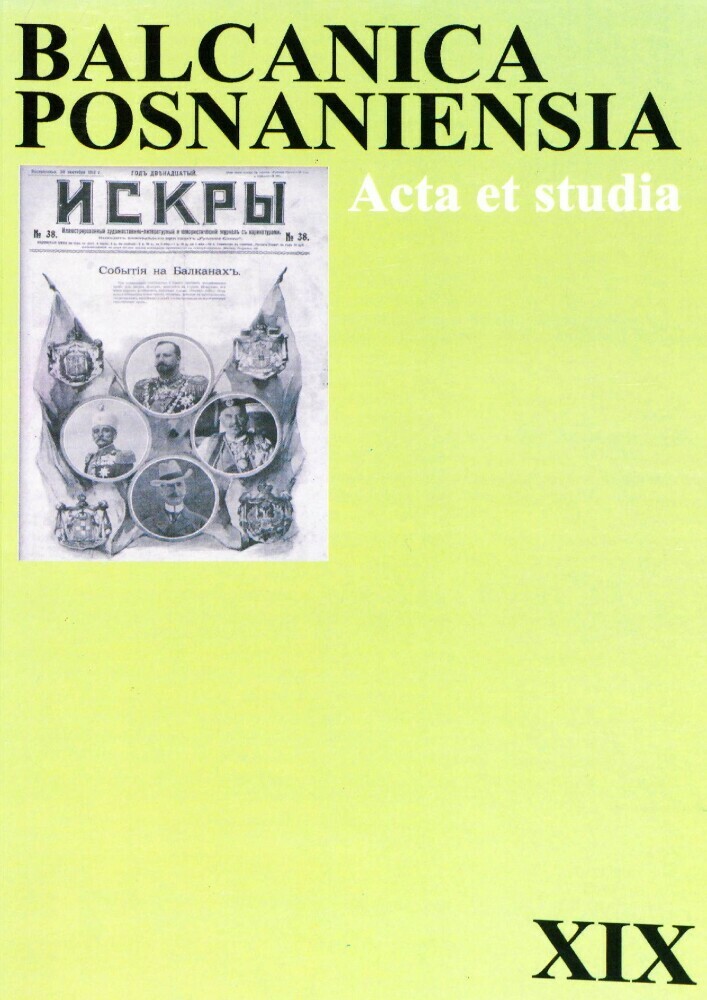Abstrakt
At the dawn of the XXth century the Balkan countries were intent on waging war against Turkey. In the preparation period, however, they had severely exceeded their economic and demographic capabilities. The arms production consumed vast amounts of money, leading to an extraordinary debt of the Balkan states. The 1912-1913 wars have proved to be a veritable ordeal for the economies of the involved countries as well as their social endurance. This great sacrifice was supposed to further the national goal of defeating Turkey and finally establishing the inter-state borders, even in the face of an impending economic collapse. The Balkan conflicts turned into a war of attrition, a harbinger of what was to come during the World War I. The pre-war efforts and the cost of the actual warfare brought Bulgaria, Greece,
Serbia, Montenegro as well as Turkey to the brink of economical breakdown and major social turbulence. The calling of 1.3 million men to arms resulted in halting the industrial production and an agricultural crisis in the countries of the Balkan Alliance. The civilian transport sector was non-existent (since all the means and assets had been requisitioned by the military) which proved fatal to the commerce. This in turn greatly diminished the states’ tax income, further worsening the financial repercussions of the war. The number of soldiers fallen, wounded or killed by cholera were reaching hundreds of thousands. Due to the harsh war conditions and the lack of suitable attention many of the wounded have become disabled, which banned them from the work market and doomed them to social benefits. Amongst the consequences of the war were also migrations of the civilians, forced by the war itself and the following border changes. The Christian refugees alone numbered hundreds of thousands, while any real means of administering to the basic needs of the displaced masses were actually non-existent. On the Muslim side the losses amounted to 620,000 Turkish soldiers and civilians. A further 440,000 have been displaced and moved to Anatolia. Moreover the pillage, the atrocity, as well as the destruction of private property have engraved the feelings of mutual hatred and longing for a vendetta in the minds of the Balkan people.
Licencja
- Autor oświadcza, że przysługują mu osobiste i majątkowe prawa autorskie do Utworu oraz że nie są one ograniczone w zakresie objętym niniejszą Umową, oraz że utwór jest dziełem oryginalnym i nie narusza majątkowych lub osobistych praw autorskich innych osób.
- Autor udziela Uniwersytetowi im. Adama Mickiewicza w Poznaniu niewyłącznej i nieodpłatnej licencji na korzystanie z Utworu bez ograniczeń terytorialnych i przez czas nieokreślony na następujących polach eksploatacji:
2.1. wytwarzanie określoną techniką egzemplarzy Utworu, w tym techniką drukarską, reprograficzną, zapisu magnetycznego oraz techniką cyfrową;
2.2. wprowadzanie do obrotu, użyczenie lub najem oryginału albo egzemplarzy Utworu;
2.3. publiczne wykonanie, wystawienie, wyświetlenie, odtworzenie oraz nadawanie i reemitowanie, a także publiczne udostępnianie Utworu w taki sposób, aby każdy mógł mieć do niego dostęp w miejscu i w czasie przez siebie wybranym;
2.4. włączenie Utworu w skład utworu zbiorowego;
2.5. wprowadzanie Utworu w postacie elektronicznej na platformy elektroniczne lub inne wprowadzanie Utworu w postaci elektronicznej do Internetu, Intranetu, Extranetu lub innej sieci;
2.6. rozpowszechnianie Utworu w postaci elektronicznej w Internecie, Intranecie, Extranetu lub innej sieci, w pracy zbiorowej jak również samodzielnie;
2.7. udostępnianie Utworu w wersji elektronicznej w taki sposób, by każdy mógł mieć do niego dostęp w miejscu i w czasie przez siebie wybranym, w szczególności za pośrednictwem Internetu, Intranetu, Extranetu lin innej sieci;
2.8. udostępnianie Utworu zgodnie z wzorcem licencji Attribution-NoDerivatives 4.0 International (CC BY-ND 4.0) lub innej wersji językowej tej licencji lub którejkolwiek późniejszej wersji tej licencji, opublikowanej przez organizację Creative Commons. - Autor zezwala Uniwersytetowi im. Adama Mickiewicza w Poznaniu na:
3.1. nieodpłatne korzystanie i rozporządzanie prawami do opracowań Utworu i tymi opracowaniami.
3.2. wysyłanie metadanych Utworu oraz Utworu do komercyjnych i niekomercyjnych baz danych indeksujących czasopisma. - Autor upoważnia i zobowiązuje Uniwersytet im. Adama Mickiewicza w Poznaniu do udzielania osobom trzecim dalszych licencji (sublicencji) do Utworu oraz do innych materiałów, w tym utworów zależnych lub opracowań zawierających lub powstałych w oparciu o Utwór, przy czym postanowienia takich sublicencji będą tożsame z wzorcem licencji Attribution-NoDerivatives 4.0 International (CC BY-ND 4.0) lub innej wersji językowej tej licencji lub którejkolwiek późniejszej wersji tej licencji, opublikowanej przez organizację Creative Commons Tym samym uprawnia wszystkich zainteresowanych do korzystania z utworu wyłącznie w celach niekomercyjnych pod następującymi warunkami:
4.1. uznanie autorstwa czyli obowiązek podania wraz z rozpowszechnionym utworem informacji, o autorstwie tytule, źródle (odnośniki do oryginalnego utworu, doi) oraz samej licencji;
4.2. na tych samych warunkach, wolno rozpowszechniać utwory zależne jedynie na licencji identycznej to tej, na jakiej udostępniono utwór oryginalny. - Uniwersytet im. Adama Mickiewicza w Poznaniu jest zobowiązany do:
5.1. udostępniania Utworu w taki sposób, aby każdy mógł mieć do niego dostęp w miejscu i w czasie przez siebie wybranym bez ograniczeń technicznych;
5.2. poprawnego informowania osób, którym Utwór będzie udostępniany o udzielonych im sublicencjach w sposób umożliwiający odbiorcom zapoznanie się z nimi.

